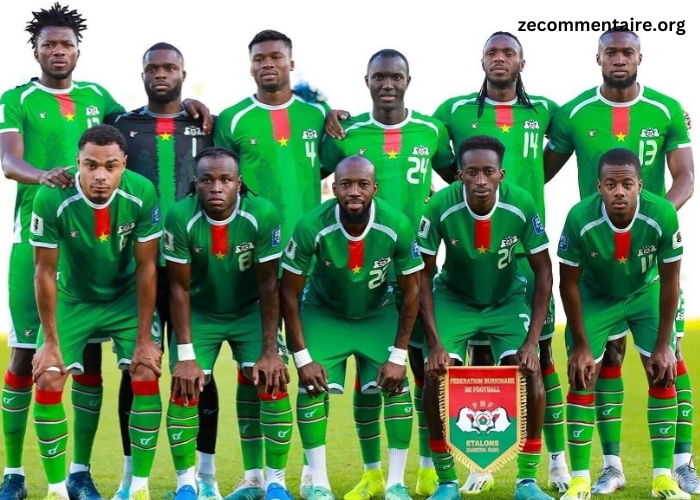The Équipe du Burkina Faso de Football, commonly known as the Burkina Faso national football team, represents the nation of Burkina Faso in international soccer. While not one of the most high-profile teams in global football, Burkina Faso’s national team has made significant strides on the continental stage and has garnered respect and admiration for its resilience and talent. This article explores the history, achievements, and future prospects of the Burkina Faso national football team, providing an in-depth look at its journey and impact.
Historical Background
The Burkina Faso national football team was formed to represent the country in international competitions. Burkina Faso, a landlocked country in West Africa, has a rich history and a vibrant football culture that has grown significantly over the decades. The team, known for its tenacity and skill, has evolved from a relatively unknown squad to a respected competitor in African football.
Early Years and Development
In the early years, Burkina Faso’s football scene was primarily local and regional. The national team played in regional tournaments and friendlies, gradually building its reputation. The country’s football infrastructure began to develop more systematically in the late 20th century, leading to increased participation in international competitions and a more structured approach to the sport.
Major Milestones
One of the most significant milestones for the Burkina Faso national team was its debut in the Africa Cup of Nations (AFCON) in 1978. The team’s early participation in AFCON set the stage for future successes. Over the years, Burkina Faso has developed a competitive edge and has achieved notable performances in various tournaments.
Key Achievements
Burkina Faso has made substantial progress in African football, achieving several key milestones that have enhanced its status on the continent.
Africa Cup of Nations Success
One of the most notable achievements for Burkina Faso came in 2013 when the team reached the final of the Africa Cup of Nations. Although they did not win the title, finishing as runners-up was a historic accomplishment for the team. This performance highlighted Burkina Faso’s growing prominence in African football and its ability to compete at the highest level.
World Cup Qualifications
Burkina Faso has also made several attempts to qualify for the FIFA World Cup, demonstrating its ambition and competitiveness on the global stage. While the team has not yet secured a place in the World Cup, its efforts and performances in the qualifying rounds have been commendable, reflecting the team’s determination to achieve its ultimate goal.
Regional Competitions and Friendly Matches
In addition to its success in AFCON, Burkina Faso has participated in various regional competitions and friendly matches, further showcasing its talent and footballing prowess. The team’s participation in these events has helped build its reputation and provided valuable experience for its players.
Notable Players
Over the years, Burkina Faso has produced several talented players who have made significant contributions to the national team and achieved success in international club football.
Charles Kabore
Charles Kabore is one of Burkina Faso’s most prominent footballers. Known for his midfield prowess and leadership, Kabore has had a successful career both domestically and internationally. His contributions to the national team have been instrumental in its achievements, and he remains a key figure in Burkina Faso’s footballing history.
Aristide Bance
Aristide Bance, a talented forward, has been another standout player for Burkina Faso. Known for his goal-scoring ability and physical presence on the field, Bance has been a crucial player for the national team. His performances in international competitions have earned him recognition and respect from fans and opponents alike.
Prejuce Nakoulma
Prejuce Nakoulma is another notable player who has represented Burkina Faso with distinction. His speed, technical skills, and attacking prowess have made him a valuable asset for the national team. Nakoulma’s contributions have been vital in key matches and tournaments, highlighting his role as an influential player.
Football Culture and Development
The football culture in Burkina Faso is vibrant and deeply rooted in the country’s traditions. Football is a popular sport, with a strong following among the local population. The national team’s successes and the passion of its supporters reflect the importance of football in Burkina Faso’s cultural landscape.
Grassroots and Youth Development
Grassroots and youth development are essential aspects of Burkina Faso’s footballing landscape. The country has made efforts to improve its football infrastructure and provide opportunities for young players to develop their skills. Initiatives to promote youth football and enhance training facilities are crucial for nurturing future talent and sustaining the growth of the sport.
Local Competitions and Clubs
Local football competitions and clubs play a significant role in Burkina Faso’s football ecosystem. The domestic league system provides a platform for players to showcase their talents and gain recognition. Successful players from local clubs often earn opportunities to represent the national team and advance to higher levels of competition.
Challenges and Future Prospects
Despite its achievements, Burkina Faso’s national football team faces several challenges as it continues to strive for success on the international stage.
Financial and Logistical Challenges
Like many developing football nations, Burkina Faso faces financial and logistical challenges that impact its ability to compete at the highest level. Limited resources and infrastructure constraints can affect the team’s preparation and performance. Addressing these challenges is crucial for the continued growth and success of the national team.
Competing in a Competitive Region
African football is highly competitive, with many strong teams vying for success in continental and global competitions. Burkina Faso must navigate a challenging landscape, where teams with greater resources and experience also compete for top honors. The national team’s ability to compete effectively in this environment will be key to its future success.
Future Goals and Aspirations
Looking ahead, Burkina Faso’s national team aims to build on its achievements and continue its progress in international football. Securing a place in the FIFA World Cup remains a significant goal, and the team will continue to work towards this aspiration. The focus on youth development, improved infrastructure, and strategic planning will be essential for achieving long-term success.
Conclusion
The Équipe du Burkina Faso de Football has made remarkable strides in international soccer, showcasing its talent, determination, and resilience. From its early years to its notable achievements in continental competitions, the national team has earned respect and admiration on the footballing stage.
As Burkina Faso continues to build on its successes and address the challenges it faces, the future holds promise for the national team. With a strong football culture, talented players, and a commitment to development, Burkina Faso is poised to make further strides and achieve its goals in the world of football.
The journey of the Burkina Faso national football team is a testament to the power of sport in uniting and inspiring a nation. The team’s achievements and aspirations reflect the passion and dedication of its players, supporters, and the broader football community in Burkina Faso.





